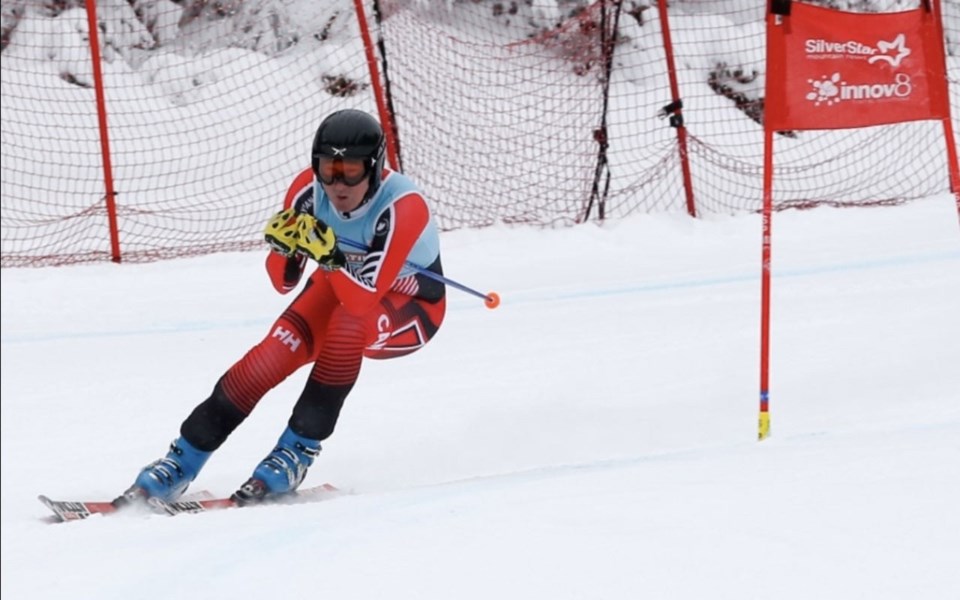Jules Lajoie has attended the Over the Hill Downhill in Vernon for the past decade, and at 74, he hopes to attend for several years to come.
The Whistler resident topped the men's 70-to-74 age category in the Master's Open Downhill at Silverstar on Feb. 9, and finished 29th overall in the Over the Hill Downhill earlier in the day.
Lajoie explained that though the course remains fairly consistent from year to year, attending the four-day camp in advance of race day is key to learning its intricacies. Lajoie noted that in 2012, his second year racing the event, he set a record by taking 46 runs in four days.
"In downhill, when you're on a particular run, it's basically set the same way every time," he said. "One of the modifications you have to make is to have functional speed.
"If you have a tailwind, for example, the faster you go and you'll have to adjust your line accordingly.
It's the speed, according to Lajoie, that keeps him coming back, as it's not unheard-of for racers to top 100 km/h with the fastest racers hitting 110.
"It is a fairly safe course as downhills go," he said. "It's not the kind of downhill course that you see on TV where the corners are very tight and you're hanging on for dear life."
Meanwhile, former World Cup racer Chris Kent came back to the race for the first time in nearly a decade, winning the men's 55-to-59 division as part of a Whistler sweep with Richard Harley and Geoff Gerhart, while also taking ninth overall in the first race.
Kent said he hit the race as part of a sojourn east to Alberta he had planned anyway. He appreciated getting back in the competitive mindset after avoiding contests like the Peak to Valley and the Saudan Couloir Ski Race Extreme because of osteoarthritis in his knee.
"Running that downhill in Vernon was just fine. It didn't bug my knee at all. It's a very easy course and it just doesn't torque out your joints the same way as a giant slalom does," he said.
Being back in Vernon, Kent said racing was just like riding a bike, as he slid right back in to the downhill course.
"I felt like I didn't even need to inspect the course. I've coached at camp and skied that course many times over the years, and it doesn't really change much other than a few feet here or there with the gate," he said.
With his coaching hat on, Kent praised Gerhart, who made a breakthrough to crack the 74-second barrier, finishing his second run in 1:13.54.
"When Geoff came down, he was really ecstatic, so a shout-out to him," he said.
Despite winning his division, the former national ski team member acknowledged feeling he could have posted a better time.
"I just didn't go prepared enough. A race course like that, you need to actually take a pair of skis and prepare them, and I borrowed a pair of skis," said Kent, who plans to be ready for the race's 40th anniversary in 2021. "In the world of downhill racing, if you want to be fast, especially on a flat course like that, you've gotta have skis that run."
The third Master's Open Downhill winner from Whistler was Tommy Thompson, who topped the 60-to-64 division and was sixth overall in the day-opening contest.
With three of top five in the opening race—Steve Hatch, Murray Smith and Willy Raine—boasting World Cup and Olympic pedigree, Thompson was more than satisfied with his results overall and in the division.
"It feels good to be the top master's [racer] for your age in Canada. It's a goal. Second doesn't quite feel as good," he said. "Gold's always a nice colour."
Thompson, a former World Cup ski jumper, credited local legends like Kent and Rob Boyd for lending a hand on the coaching side.
"It's nice to have those big-name guys there, and they suck it up," he said. "If it was a harder course, they'd be doing better, so it's nice of them to take one for the team."
Though people come from all across Canada and even the world, including from Australia, to take part in the event, numbers have dwindled from highs of more than 300 to roughly 80 this year. With few downhill options for masters' skiers, though sometimes FIS races at Kimberley will run a masters' division on occasion, there's a strong desire from Thompson and the other locals to see it continue.
"You see the same people every year and you're all going for beers after," Thompson said. "You all watch the videos and there's a little bit of trash talk. The normal stuff."




